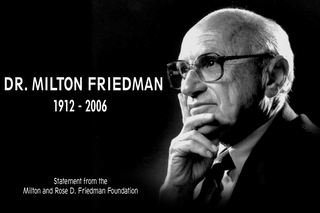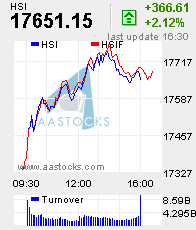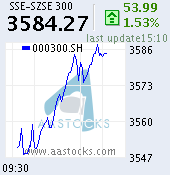哀悼佛利民(Milton Friedman)---當代自由市場經濟學大師

當代自由市場經濟大師、1976年諾貝爾經濟學獎得主佛利民(Milton Friedman)因心臟衰竭逝世,享年94歲,於此深表哀悼。
佛利民憑藉「消費分析:貨幣理論及歷史」贏得諾貝爾經濟學獎,他的名句《 世上沒有免費午餐 》,一針見血地說出經濟學的精髓,更成近代經濟學的經典名句,他對經濟學研究的貢獻我相信無人可代替,他離世前仍關注作為自由市場標記的香港,我覺得這是香港的光榮,他並於上月在《華爾街日報》發表一篇題為《Hong Kong Wrong》的文章回應曾蔭權放棄積極不干預的言論。他在50年代提出學券制(Voucher System),認為家長有自由權利替子女選擇心儀的學校,而政府則發學券給家長用以支付學費,學校可以憑學券向政府取得資助,但香港所提出的幼兒學券計劃則似乎顯得非驢非馬,原因是為什麼好的私立幼稚園不能受資助?
中國八十年代開始進行的經濟改革,佛利民於是多次訪問中國,他提供了很多寶貴的意見,並盛讚當時的中國共產黨總書記趙紫陽是他所見過的社會主義國家最好的經濟學家,回想當年八十年代他和趙紫陽討論中國經濟改革所遇到的種種問題, 再看看中國今天的經濟成就,我不禁由衷地感謝他對八十年代中國開始的經濟改革所作的貢獻。
by tcwong also at http://tcwong.blogspot.com/
The Power of Choice - Milton Friedman:
Milton Friedman also at Video Link --- The Power of the Market 市場的力量
* Attached with the recent article written by MILTON FRIEDMAN on October 6, 2006 on Wall Street Journal
附上佛利民先生臨走時對香港的關心,文章由佛利民先生撰寫,並原刊於10月6日的亞洲華爾街日報,現翻譯轉載如下。 ------
香港搞錯了!
要發生的始終會發生。香港的積極不干預太美好,但太美好的事總難長久;這個政策理念違反天下政府官僚花費和干預成性的本質,所以當香港的領袖曾蔭權先生上個月宣佈這個讓香港繁榮起來的政策已經死亡,我不驚訝,但總令人感到哀傷。
曾蔭權的前輩在過去半個世紀,成功抗拒了徵稅和干預的誘惑,那是真正了難能可貴的成就。雖然當年宗主國英國信奉社會主義,幸得郭伯偉這位英國公務員,殖民地香港才追隨了自由市場的資本主義政策。郭伯偉最初在1945年被分派到香港主理財經事務,並於1961至71年擔當香港的財政司。今年1月21日逝世的郭伯偉,最為人津津樂道的事跡,是他拒絕收集經濟統計,怕數據只會讓官僚有更多藉口去作出更多干預,他的後任人夏鼎基創造的「積極不干預」一詞,所描述者正是郭伯偉的施政原則。
郭伯偉政策的確帶來卓越成果。第二次世界大戰後,香港只是一個極貧困的小島,當時香港的國民平均產值大約是英國的四分之一,到了1997年, 香港主權移交中國時,香港的國民平均產值已經大致相等於前殖民地宗主國,即使期間英國也有可觀的經濟成長。只要讓人民有空間去追求他們自己的利益,自由社會的生產力也可以得到彰顯。
香港自由社會的成功,鼓動了中國和其它國家擺脫中央指令計劃經濟,投向私人企業和自由市場。結果,這些國家都受惠於迅速的經濟增長。我相信中國的未來命運,將取決於她繼續隨香港的成功路向發展的速度,會否比香港向中國同化的步伐更快。
曾先生堅稱只會在「市場結構運作出現明顯缺陷時」,才讓政府出手干預,可是他忽略了現實上若真的出現了有任何「明顯的缺陷」,市場也會在曾先生出手之前把它消弭。更重要的是,所謂的「缺陷」無論是明顯還是不那麼明顯,都是由過於大有為的政府引申出來。
積極不干預在過去半個世紀使香港免於不少政府輕率干預的惡習,因而得以繁榮富足。傳統的慣性,雖然一定程度上可以限制政府的干預;政策上有所改變,香港仍可在未來的一段日子繼續繁榮富庶。儘管香港會繼續發展, 但將不再是自由經濟的一個光輝標記。
郭伯偉精神帶來的成就,也不會因此被忘記。無論日後香港發生什麼事情,過去五十年的香港經驗,將繼續指引和鼓勵信仰自由經濟的朋友,為世界各地希望造就繁榮的人士提供經濟政策的典範。
作者佛利民(Milton Friedman),是1976年諾貝爾經濟學獎得主,離世前任史丹福大學胡佛研究所資深研究員。
另外附上英國人為Milton Friedman寫的悼文:--------------
Milton Friedman - An enduring legacy
An enduring legacyNov 17th 2006From Economist.com
One of the most influential economists of the 20th century has died
MILTON FRIEDMAN won the John Bates Clark Medal, awarded to an outstanding American economist under the age of 40, in 1951. Many consider it harder to win than a Nobel Prize. One of the measures of his greatness is that when he got it, he still had not done any of the work for which he would become most famous. Still to come were the permanent-income hypothesis, his groundbreaking “A Monetary History of the United States” (co-written with Anna Schwartz) and the proposal of a natural rate of unemployment.
These works revolutionised the conduct of central banks around the world. But to non-economists Mr Friedman's great achievement is not his challenge to Keynesian demand management but the popular writings that challenged a consensus favouring ever-greater state intervention in the economy. This work, too, came long after his peers had recognised him as a leading light. At the time of his death on Thursday November 16th, the 94-year-old economist was still working to spread his ideas about free markets, this time through a documentary for American public television.
It is another mark of his greatness that so many of the ideas that seemed crazy when he came up with them—from blaming the Depression on bad central-bank policy, to school vouchers and the volunteer army—have gained mainstream acceptance. But Mr Friedman always recognised that his success was fragile; free markets and stable money have lots of enemies, particularly among politicians. He has left us a staggering legacy of economic theory and public-policy prescriptions—but is that inheritance growing or shrinking?
Certainly, on the monetary side, Mr Friedman remains a giant. His critics point out that central bankers no longer try to target the money supply directly, but to those who remember the inflationary 1970s it is perhaps more important that futile attempt to push unemployment to zero no longer trigger inflationary spirals. In developed countries politicians may talk like Keynesians, but they behave like monetarists, looking to the central bank, rather than fiscal policy, to stave off inflation and recession.
And what of his other crusades? His proposal of a volunteer military force, once rejected as impractical, is now so deeply ingrained in American culture that politicians who proposed bringing back the draft for the war in Iraq were dismissed as crackpots or worse. His quest to replace anti-poverty programmes with a "negative income tax" that would give cash to the working poor has come to fruition in the form of the earned-income tax credit. This is now the favoured policy prescription on both left and right for boosting incomes at the bottom. School vouchers, too, are making progress, albeit slowly. And where they are not, the idea that students should be able to choose between public schools is nonetheless bringing competition to America’s educational system.
Even outside his homeland, his ideas continue to make inroads. He was pilloried for briefly advising the Pinochet regime in Chile, where his students, "the Chicago boys", ran economic policy. Thirty years later that oppressive government is gone but his free-market reforms have made Chile the economic star of Latin America. The World Bank and IMF continue to push for stable financial systems and market-based reforms around the world. Proposals like the negative income tax were forerunners of the consensus growing in Europe (and elsewhere) that governments should provide safety nets through taxation and distribution of cash benefits rather than heavy regulation of markets.
But despite Mr Friedman's work, thickets of regulation thrive in most countries, particularly his homeland. Nor has he succeeded in trimming back the state, which is still growing in many places, including America. Ironically, another legacy may be to blame: income-tax withholding, which he helped to invent during the second world war. The fact that the tax is deducted from most peoples' pay before it reaches their pockets is perhaps the main reason why the state has been able to grow so large. Mr Friedman deeply regretted this contribution to economic science—but like his other inventions, it will long outlive him.











